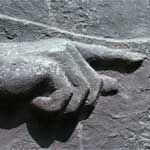What does the Bible say - Discover Your Faith - Faith Questions

"How does it work with faith? What do I have to do to be a Christian? ”Many people ask this or something similar. This question is justified and understandable. After all, you have to know where to start in the first steps in faith.
I am happy about people who start asking questions. Because with them the interest has awakened to learn more about the Christian faith. People who want to know what to do. People who are starting out and who are ready to go and tackle things. That's great.
But this is exactly where we discover something interesting: in the Bible we find a completely different order. It's not about people first. So what we do or don't do. It is not about our actions, our thinking or our will. This is not the main point. In the Bible we are told what really belongs in the beginning. It is no coincidence that the first book of the Bible begins with the words: “In the beginning God created heaven and earth” (Genesis 1: 1).
And also in the Gospel of John, one of the four descriptions of the life of Jesus Christ, the sentence begins: "In the beginning was the word, and the word was with God, and God was the word" (John 1: 1). It all starts with God. Not with man or chance or matter or idea or with whatever. At the beginning of all things there is none other than God Himself.
Understanding that is healing. Too often we think that everything starts with us. We have an unrealistic picture of our own meaning. We consider ourselves the center of the world. We set our opinion and our horizon of experience absolutely and do not notice how limited we really are.
So it is good to rediscover the order: in the beginning is God. Not just any god or idea of God, but the true, the living God - "Yahweh" (as the Bible calls him), the creator of heaven and earth. Anyone who understands this and then begins to take God seriously has already taken the first steps on the path to faith.

It's astonishing: Studies have shown that almost all people pray. No matter whether religious or not - there are hardly any differences here. At the latest when we are really bad, we send a prayer to heaven.
Deep down, everyone knows or suspects that there is a higher power. This applies to all peoples and cultures. In many religions, however, the face of this “higher power” is double-edged: one feels fear rather than trust and looks for ways to protect oneself from this unpredictable power. Because God is the great unknown, about whom little or nothing is known. Some people, on the other hand, only believe in an impersonal fate, a kind of cosmic machine or an abstract system. That's why they often turn to powers that seem closer and more responsive to them. For example, to spirits, angels and / or to spiritual beings in the hope that they will protect them.
In the middle of this confusing picture comes a statement from Jesus Christ, in which he explains what real prayer looks like: “Ask, so you will be given! Search, you will find! Knock on the door and you will be opened! ”Is that how easy and direct should the conversation with God be? The question behind our doubts is: what is God really like? Because it depends on how we can pray. And here, too, Jesus gives clear information: "If you give your children good gifts, how much more will your Heavenly Father give good gifts to those who ask him for them!"
That is the key: God, the Almighty, who created everything, wants to show himself to us as "our father". For those who get to know God in this way, prayer is no longer a mandatory exercise, but an expression of a very personal relationship. This invitation is expressed at the beginning of John's Gospel: "He gave all who received Jesus the right to be God's children" (John 1:12). There is no doubt who experiences this: Prayer helps.

What does it mean to be a Christian? Actually a simple question, you should think. And yet there are many misunderstandings at this point. Common equation applies: A Christian is a good person, someone who can not be indebted. Others think: Christians are those who are baptized and who are members of a church. Still others equate being Christian and equating social commitment: A Christian is someone who works for the disadvantaged.
Each of these views has a real core. Certainly a Christian should strive for a decent life. Of course, every Christian should be an active member of a Christian community. And of course, as Jesus did, a Christian will especially turn to those in need. And yet: That alone does not make anyone a Christian. Because Christianity is not defined by what a person does, but by whom he belongs. The word "Christian" itself says it very clearly: A Christian is someone who belongs to Jesus Christ; a Christian is one who has connected his life with Christ.
No one is automatically a car just because he was born in a garage. Likewise, no one is automatically a Christian because he was born in a Christian family or environment. Being a Christian needs a decision that everyone has to make personally. It is the decision not to lead your own life, but to live consciously in the relationship with Jesus Christ. In the New Testament we can read how the first Christians came to this decision. One day they met Jesus, who spoke to them and asked them to leave everything behind and to follow him. Simon and Andreas, Johannes and Jakobus, these were the names of these first followers of Jesus.
Since these days countless men and women from all countries and cultures have consciously lived as Christians. They are all people who have heard the call from Jesus: "Come and follow me!" They are all people who have found real life on the way with him. Christianity is therefore not a question of religious affiliation, but of anchoring life: Christians have their center of life in Jesus Christ. An offer that applies to everyone.

Belief in God is not theoretical. It is not a mental experiment, but a new way of living. Everything changes: thinking, feeling, acting. The inner attitudes as well as the deeds. This complete reorientation inevitably follows from the fact that a new factor has come into being. This factor is called God. With God light comes into life. Everything looks different because this light shines on it. Before I got to know him, the world was a mystery to me: where do I come from? Where am I going? Why is there me at all? Why does what I see around me exist - trees, flowers, stones, animals, people, stars? What's the point of everything? If I am a product of chance, I can only thank chance for my existence. But chance has no face; no eyes to see me; no ears to hear me; no mouth to talk to me; no heart to love me
But because God is the real author of world history, I suddenly know who I can thank. When I raise my eyes to the sky, I don't stare into space. No, my eyes are returned. One would have to say even better and more correctly: I am finally looking up at my creator, who has always looked at me, his creature, with love and sympathy. And I notice: He is not a distant, uninterested, hard God. Rather, he is the loving father whom Jesus Christ painted before our eyes and about whom the writers of the Old Testament, the first part of the Bible, already reported. This is how the psalms describe him: "The Lord is merciful and gracious, patient and of great kindness ... Just as a father has mercy on his children, so the Lord has mercy on those who fear him" (Psalm 103).
Because that is the case, gratitude is our only appropriate response. "Thank the Lord, because he is kind, and his kindness lasts forever!" If we do this, in the middle of everyday life, we will be overwhelmed by a light that never goes out. Every day is a key to joy and a key to God's experience: practice gratitude.

Turning to God always encompasses the whole person. The feeling is as involved as the mind. The head and heart are equally challenged when it comes to meeting God.
God as creator is immeasurably greater than the creature. And because he is not just the god of a sub-area, but encompasses everything in everything, it cannot be otherwise than that we all have to use our senses to try to grasp him. Jesus expressed this fact as follows: "You shall love God your Lord with all your heart, with all your soul, with all your strength and all your mind" (Matthew 22:37). Meeting God includes thinking, feeling, willing, acting and everything else. Therefore, it is important that we also strive for intellectual knowledge of God on the way to God. Mind and thinking are required.
It is very clear: if a mortal man who is involved in space and time wants to grasp the immortal eternal God, it is an impossible thing from the beginning. It is as if a child wanted to empty the ocean with a plastic bucket. Even if all the children and adults in the world worked on it at the same time, it would not succeed. And so we face a dilemma: On the one hand, we should strive for knowledge of God. On the other hand, we know that this cannot succeed, at least not on the path of human effort. Happy who ever reaches this point of knowledge!
But here God comes to our aid when we ask him to do so. He has prepared a way for us to recognize him. It is a double way. First, he invites us to a life experiment. This experiment is the living faith, the trust in the presence of God in everyday life. In this way we get to know God better bit by bit. Second, God sends His Spirit into our hearts. He himself comes close to us and enlightens us so that we can recognize him - in the power and reality of his spirit. We can ask him for that to happen.

Peace - this word is high on many people's wish lists. Peace prayers and demonstrations for peace attract thousands. We are ready to work for peace. And yet our capacity for peace seems limited. This is shown by the countless armed conflicts that have taken place in the past few decades alone.
We don't have to go into big politics to see how difficult it is with peace. Even in the smallest communities, in families and neighborhoods, among friends and at work, it is not easy to keep peace. The inability - or unwillingness - to peace has its origin in the human being and has an impact in all areas.
The Bible says that God is a "God of peace" (e.g. Romans 15:33; 1 Thessalonians 5:23). And that is why the source and source of peace can be found with him. When God comes close to us, we also experience His peace. He wants to present us with his peace in a comprehensive sense. He invites us to make "peace with God". The basis for this is that God already made peace with us when Jesus Christ died on the cross on our behalf. He took our guilt and bridged the gap that separated us from God. God has overcome the enmity of those who did not want to know anything about him and made us his friends. Anyone who accepts this can now say "father" to him and belongs to his family. The experience that everything is forgiven now fills our hearts with the peace of God. So this peace is not just an "objective fact", but can become a personal experience.
Those who have found peace with God can also learn to live in peace with others. God's peace now covers all areas of life. So we can really find peace, also with regard to our own life story.

What is belief? Is it a vague guess, an inexact knowledge? A weak hope based on wishes and hearsay? The biblical understanding of "belief" is very different.
To understand this, we have to look at the biblical origins - Hebrew for the Old Testament, Greek for the New. The Hebrew word for faith actually means “to be firmly founded, to stand on something”. So to believe means to stand on a basis that is firm. It is not belief that must be firm, but what it is based on. We find a similar word meaning in Greek, where the word has the meaning “to fasten, to attach”. So when it comes to belief, the question is not how strong or convincing the belief itself is, but whether what one believes in is credible and reliable.
Therefore, believing in God does not mean to imagine from the head that there could be a God and to weigh the pros and cons of this view. But believing in God encompasses the whole person, his thinking, feeling and willing. And last but not least, what he does.
A picture can best illustrate this. Let's imagine a pond is frozen over in winter. Many are out and about on the ice sheet, skating or sledding. A person stands on the edge and wonders if the ice will hold him too. The others wave to him, encouraging him to take the step onto the ice sheet. He will only be certain of the question of whether the ice will support him if he dares to leave the safe shore and go on the ice.
So it is with faith: it is the answer to God's promise that he wants to be with us. To believe in God means to rely entirely on Him. Putting him first and then experiencing that God is not just a thought, theory or vague idea. Those who dare to entrust their whole lives to God will experience miracles.

What picture do we have of God? A lot depends on it. For some, God is little more than a philosophical thought, an interesting way of thinking. It exists for others, but it is far away and has no real meaning for their everyday life. Some see God as a dear grandfather with outdated views, who is never angry, who says yes and amen to everything. Still others see him as a heavenly policeman who pettily keeps a tally of our big and small crimes.
If one adds the ideas of God of other religions, it becomes clear that there is a great diversity and arbitrariness. Is there only one god or maybe thousands? Is God recognizable or completely unfathomable? With all the different ideas it becomes clear: what we think about God shapes our behavior towards him. And one more thing becomes clear: We humans are experts in creating "images of God" for ourselves, depending on our preferences and needs. But with this we constantly violate the second commandment: "You should not make a portrait or any parable. Do not worship them and do not serve them!" (Exodus 20: 4 + 5)
The Bible contrasts human ideas of God, vague notions and self-made images: God is holy. The holiness of God is the basic fact when we think about him. Today the word "holy" can hardly be found in our language. What exactly does "God's holiness" mean? The prophet Isaiah had a vision in which he perceived God's holiness. His reaction: "Woe to me, I'm going away!" (Isaiah 6: 1ff)
God is holy, which means: God is terrifyingly different than we can ever imagine. God is more concrete, more real than we ever thought. He is the light, we are the shadows at best. God is absolutely good and pure. He is pure power, pure love, pure authority. The Bible uses an image for this: "Earth and heaven fled from his face" (Revelation 20:11). If a person gets any idea that God is holy, he is on the right path to faith. Because: "Awe of God is the beginning of wisdom" (Proverbs 9:10).

Finding God also means finding yourself. So the statement is right around. Because God is the creator of our life. From him we get everything that makes us human. It is the origin of our identity. However, this statement is often reversed. It is said: "If we search within ourselves, we find God." But that's not true, for several reasons.
First: God is God and man is a man. God is the creator, we are his creatures. There is an infinite distance between the Eternal God and us limited by time and space.
The second reason is equally significant: God is holy, infinitely wise and good. However, according to the Bible, we humans are characterized by sin. In other words, we have turned away from God. So we find both in ourselves: On the one hand, as creatures of God, a piece of him - what the Bible describes as "the image of God". And on the other hand, exactly the opposite, namely the destruction of this reality.
All of this has a direct impact on our identity, i.e. on the question of who we actually are. We have an idea of where we are from. The Bible says that God placed "eternity in our hearts". (Ecclesiastes 3:11) On the other hand, this identity originating from God is distorted in us, instead "the poetry and the striving of man is always evil" (Genesis 6.5) This tension describes the identity of us humans without God.
But that is not the end. Through the redemption that Jesus Christ brought into this world, we can become new people. "If someone is in Christ, he is a new creation, the old has passed, see, new has begun" (2 Corinthians 5:17). We can rediscover our true identity when we find new God through Jesus Christ. The church father Augustine had experienced a complete renewal of life through the encounter with him. In his book "Confessions" he puts it this way: "Towards you, God, you have created us, and our hearts are restless until they find peace in you."

There would be no Christian faith and no church without it: Jesus Christ. The West would have a completely different face, indeed the entire world history and world culture would have looked very different if Jesus hadn't existed for 2000 years.
He is the central figure. No other person has written so many books about Jesus, no other is the subject of so many works of art, paintings, poems, hymns and songs. The book he reports, the New Testament of the Bible, has been translated into more languages than any other book and has been published in billions of copies.
Amazing effect
Little seemed to indicate that this man from the village of Nazareth in Galilee would become so important. He lived in a rather insignificant area on the edge of the Roman Empire, he had no funds, no army, no state apparatus or the like. His public work lasted a maximum of three years. How can this amazing effect of this person be explained?
Window to heaven
The Gospels, which describe the life of Jesus, record the essentials in their precise scarcity and concentration, the image of a truly extraordinary person who had a tremendous impact on all who met him. Not just the amazing healings that happened through him caused a stir. And it wasn't just the wonderful stories he told, stories that were like windows in the sky.
It was Jesus himself who attracted people. The children ran up to him and let him hug and bless them. Whoever looked Jesus in the eye suddenly discovered his own heart. Before Jesus, everyone had to answer, answer the question of truth and lies, right and wrong, obey God, or rebellion against him. No wonder that some turned against Jesus. Against better knowledge, they closed themselves against him and looked for ways to put him out of the way. So Jesus was finally captured and nailed to the cross like a common criminal.
Not the end
If that were the end of the story of Jesus, he would surely be long forgotten today. But death could not keep Jesus. If you want to know more, you should definitely read the Gospels and seek contact - with the living Jesus.

On church towers, as chain pendants, in cemeteries: we encounter the cross everywhere. Many still vaguely know that it has something to do with the Christian faith. But what is behind this symbol?
What is the symbol of the cross?
The cross. Two bars, put together, with a dying body on them. The one who dies is Jesus, a man from Nazareth. His followers believed in him as the Messiah, as Savior and Redeemer. His enemies see him as the rebel and blasphemer. So they decide to eliminate it. Jesus does not resist when he is betrayed and handed over to the power of the Jewish leaders and Roman occupiers. He is nailed to the beams on a small hill outside of Jerusalem. Still dying, he prays for those who kill him: "Father, forgive them, because they don't know what they're doing!"
Senseless event?
Is it just a heroic death? Is this unjust judgment and this cruel execution just another senseless event in world history? The biblical gospels, which represent the life of Jesus, tell in detail about his death. For them it is the center. Because here Jesus seals what he said and lived. He himself explained why he had to go to the cross - and wanted: "I did not come to be served, but to give my life as a ransom for the many" (The Bible, Mark, chapter 10, verse 45). His death on the cross was the turning point in world history. Because the question is not: how was his death - how terrible, cruel and unjust? But the deeper question is: who is it that dies here?
Plus sign of life
The Bible answers: It is God Himself who became man in Jesus and who was guilty of all mankind. It is he who is executed on the cross and dies on behalf of everyone. Jesus is the sacrificial lamb that carries away the sins of the world. This is what John the Baptist said in the visual language of the Bible. The cross is rightly the center of Christianity. Because here God turns everything around: Sin is forgiven. Death is defeated. The symbol of death becomes an indelible plus sign of life.

"God is love, and whoever stays in love remains in God and God in him," says the Bible in the first letter to John, chapter 4, verse 10. This statement from the New Testament is like a window into one illuminated room. This is how God shows himself to those who are looking for him.
God is love - a unique statement.
God is love - this statement is unique in the world of religions. They often start from a multitude of gods that are in conflict with each other. And when, like Islam, the founder of which Mohammed has borrowed heavily from Jews and Christians, she wants to proclaim a single God, it is often rigid, immobile and unapproachable. Or he is bloodless and faceless, like the god of philosophers, more of an idea than a living creator and designer.
Dedication
God is love - this is very revolutionary! Because it has to measure every idea of God, but also our very practical life. God is love, and this love shows itself again and again: In countless benefits of God and especially in the life and death of Jesus Christ. On the cross, God's love is revealed in all its self-giving: "God loved the world so much that he gave up his only son" (The Bible, Gospel of John, Chapter 3, verse 16). The love of God is not an empty thought, but gives itself to us humans who we would run into nothing without this love. That is why the cross is the symbol of Christianity: God, who sacrifices himself for a godless world.
More than love
Love has had a form since the cross: that of Jesus of Nazareth. And that is why the reverse sentence is not true: love is God. No, God is much more than love! He is also omnipotence, omniscience, holiness, purity, authority ... - Words are not enough to describe him. And he cannot be pressed into our ideas, not even our ideas of love.
But he opens his heart to us. And when we see it, we are changed. His infinite love ignites us to love. Our life becomes bright, filled with love, which brings hope and trust, peace, patience, serenity and kindness. Martin Luther once said: "God is a glowing oven full of love." Whoever meets him cannot remain cold and indifferent.

We cannot redeem ourselves. We humans can do a lot, but we are very helpless when it comes to God. We cannot use our own strength, piety or knowledge to bridge the gap that separates us from God. We can't do it alone.
The connection between God and man was broken - and restored by Jesus Christ.
For many of us, this is a very bitter pill that we don't like to swallow at all. Because nobody likes to be told that they can't do something. We would like to have everything in hand. But we cannot come to God out of ourselves. This is a very central truth of Christian belief. Here the message of the Bible differs fundamentally from all philosophies that focus on people themselves. We need help. Help with God, with heaven, with new life. At the latest here we are at the end of our own possibilities. We cannot recognize God by ourselves or please Him.
In need of assistence
If we have the courage to look at our life honestly, we will notice that in reality we need help not only here, but also in countless other things. The north German poet Matthias Claudius put it in a classic way: "We proud human children are vainly poor sinners and don't know much at all. We spin webs of air and look for a lot of arts and get further from the goal!"
But that's exactly what it's all about: reaching the goal. The goal of our life is accomplished only in God. Only when the broken connection to him, our origin, is healed again can we take hold of real life.
Bridges the gap
The good news of the Bible is that the gap has long been bridged. God made his way to us. He himself became the bridge by becoming man in Jesus Christ and being a true God at the same time. He is the mediator who, figuratively speaking, brings heaven and earth together with his outstretched arms on the cross: "Because there is a God and a mediator between God and men, namely the man Christ Jesus, who has given himself for all Salvation "(The Bible, 1 Timothy, chapter 2, verses 5 + 6).

Jesus called disciples to follow him: "Follow me, I will make you fishers of men!" (Matthew 4:19)
However, following also describes an attitude to orient oneself towards Jesus. This can also have negative consequences, “taking on the cross (Jesus)” (Luke 14:27), denying yourself (Mark 8:34), i.e. H. To accept disadvantages. But there is a great promise in following Jesus: “Whoever follows me will have the light of life.” (John 8:12)
Jesus also gave us the mandate to follow. So we can read the following text in Matthew 28: 16-20.
The mission order
But the eleven disciples went to the mountain in Galilee, where Jesus had given them. And when they saw him, they fell down before him; but some doubted. And Jesus came up and said to them, All authority in heaven and on earth has been given to me. Therefore go and make disciples of all nations: baptize them in the name of the Father and the Son and the Holy Spirit and teach them to keep all that I have commanded you. And behold, I am with you every day until the end of the world.

Making sacrifices isn't exactly popular. We find it rather uncomfortable to give up something. Nevertheless, the thought of sacrificing, letting go and giving up is deeply anchored in our consciousness.
At the time of the Bible, animals were burned as sacrifices to God.
In almost all religions, people try to make a difference by offering sacrifices. They sacrifice fruits or a slaughtered animal to their deity and hope to gain the good will of the gods or forgiveness of sins. Because around the globe there is a memory of a rift anchored deep in the soul of humanity. The rift in the relationship between God and man, which man has always tried to cement.
Sacrifice to god
The Bible also sacrificed. The Old Testament speaks of sacrifice of thanks and praise, but also of the great sacrifice for forgiveness of sins on the day of reconciliation. But unlike usual, these sacrifices are not made to the ancestors, many different gods or even evil spirits. Because all life comes only from God, because he alone is the creator and true ruler, only he is entitled to these sacrifices. By making these offerings, God's people recognize God's rule and show that they know that they are totally dependent on them.
Learn to do good
Already in the Old Testament it is clear that these victims are only temporarily valid. God shows that he is concerned with something completely different from these external sacrificial services. So the prophet Isaiah says on behalf of God: "What should I do with your many victims? Asked the Lord. I don't like the blood of bulls, lambs and goats. Put an end to your evil goings-on! keep the violent in barriers, help the orphans and widows to their rights! " (The Bible, Isaiah chapter 1, verses 11-17). So God does not want sacrifices, but a renewed life.
Victim for love
The story of God goes even further. Because all human sacrifices are not enough to heal the rift between God and man, he sacrifices himself. Jesus, God's Son, sacrifices himself by his death on the cross. He dies so we can live. The Creator himself gives himself in Jesus for his creature - out of love. Anyone who understands this can now really live differently - a renewed life out of gratitude for Jesus.

If you want to understand the biblical view of world history, you cannot avoid this topic: prophecy.
Prophecy is more than just predicting the future.
God needed the prophets as a mouthpiece for his dealings with the people of Israel and ultimately with all peoples of the world. In the Old Testament, therefore, most of the prophetic books. Prophets bring messages from God, sometimes directly to individual people - sometimes to entire peoples and for entire epochs. We know some "great" prophets: Isaiah, Jeremiah, Amos, Micah; maybe also some "little ones" like: Obadja, Nahum, Zephanja, Maleachi. "Large" or "small" simply means the length of the books in the Old Testament.
But we also encounter prophets in other historical books: Nathan, for example, who confronted the great King David with his guilt. Or Elijah, who called the people of Israel back to a true and living God. But prophets were not only sent to Israel. For example, Jonah was given the task of calling people to repent in Nineveh, the capital of the then world power of Assyria. So prophets had a very important place in history. But what exactly is prophecy?
More than predicting the future
In the Bible, prophecy is more than just predicting the future. Prophecy means bringing God's Word to people - concrete, pointed, and with the need to choose, here and now. And the Bible distinguishes between true and false prophets. True prophets are people called by God who, on his behalf, warn of wrong ways, threaten God's judgment and proclaim his grace. They stand for God's standards, for justice, justice and truth, and they speak out against idolatry and oppression of the poor.
The colon
Nevertheless, the messages of the prophets in the Old Testament are still open. They speak of God's good goals with the whole world and point to the coming Messiah who will bring God peace, salvation and salvation. So prophecy is like a colon. Like an endless sentence. It only finds fulfillment in Jesus Christ: He is the point behind the sentence. It is the center of God's world history.

Water is precious in the Middle East. In the long periods of drought between the rainy seasons, you have to know exactly where it can be found. This experience is used repeatedly in the Bible as a symbol for our life.
We need water to survive.
The psalms in particular tell in pictorial language about the path that a person travels and the sources that he has to find on this path in order to get further: "When they wander through the desert valley, sources break up there." (The Bible, Psalms, Chapter 84, Verse 7)
What do these sources mean for our lives? How can we get on our way without thirsting? What sources can we draw from?
Source 1: God's Word
One of these supply stations is God's Word. The Bible tells us what is good for us and we learn more about Jesus Christ. We read what good plans God has for this world and how we can share in it. We can draw new strength from the Bible at all times of our lives. It helps us to keep an eye on things.
Source 2: Prayer
Prayer is another source. It is a very personal conversation with God, our Father, our Creator, our Redeemer, our friend, our Lord. Prayer consists of talking and listening. When we pray, we always draw new strength and joy from the immeasurable wealth of God.
Source 3: Community
The community is also a source of strength. No one has to be alone as a Christian. We have sisters and brothers. As a "family" we can and should help each other, support, stand up for each other - also in a very practical way - and pray for each other. The community of Christians is a source of strength when our own strength is insufficient.
Source 4: God's Spirit
And finally: God's spirit. It is the greatest source of power at all. As the creator of this world, God gives his creative power, his spirit, to the hearts of those who believe in him and ask him for it.
Discovering these sources and drawing from them is vital if we want to live as Christians. This is how God comes close to us. This keeps us in touch with him. Christians are not self-sufficient who live from their own strength and effort. Christians live on the supply from the sources that God gives them.

Humanity has always been concerned about justice. We find every kind of injustice painful and long for a world where justice prevails.
We look for justice.
But even though we have a fine sense of right and wrong, even though we quickly recognize and condemn wrong and unjust behavior, we often do exactly what we criticize others.
Contradiction
The Bible also deals with this. In many places we are called to live fairly: “You have been told; Man, what is good and what the Lord demands from you: namely keep God's word and practice love and be humble before your God ”(Micah chapter 6, verse 8). However, even though we affirm justice and God's commandments, we break them - in our thoughts, words, and through unjust action. The Bible also knows this contradiction: “Therefore, oh man, you cannot apologize for whoever you are, who you judge. Because in judging the others, you condemn yourself because you are doing exactly what you judge ”(Romans, Chapter 2, Verse 1).
Get out of the dilemma
So we are in a dilemma. Our own conscience condemns us because we do exactly what we know is wrong. And the Bible shows us that no one can live fairly on their own. This should actually plunge us into deep despair or could result in us becoming numb and apologizing for what we can do that we cannot do otherwise. But the Bible also shows us a way out of this dilemma.
God is righteous and his righteousness is an unchangeable standard. But God himself also fulfilled all righteousness. In Jesus Christ he, the judge, takes on the role of the guilty. On the cross, he takes on the misconduct of the whole world and acquits us with it. God justifies us in Jesus, he speaks to us justly. In this way a new, changed life becomes possible. The word justification in this context expresses this tremendous event in a very condensed form: In Jesus, God bears our own fault.

"And forgive us our guilt, as we also forgive those who owe us!" This sentence has it all. It is part of the prayer that Jesus gave his followers as a kind of “model prayer”. This is how they should pray. To forgiveness of guilt.
Jesus' followers should pray for forgiveness.
Fault. It is an ugly word. Nobody likes to hear it. We are quick to identify grievances, misconduct or guilt in others, but we often find it extremely difficult to admit guilt ourselves. The Bible, on the other hand, is not shy about naming guilt by name. She's not talking around the bush. The guilt of the big and the little is ruthlessly revealed: When David, the great king, committed adultery, which he then tried to cover up with sneaky murder, the prophet Nathan confronted him in the name of God: "You are the man!" David's true greatness was shown by admitting his guilt and asking for God's forgiveness.
To make up for guilt
Guilt is the basic requirement of the Bible and is also the experience of all humanity. In all religions one hopes to make up for guilt. In Islam there is still uncertainty as to whether God forgives because he cannot be pinned down. In Hinduism, it is believed that the new karma can be used to work through the bad karma - the accumulated guilt. The Greek dramas portray people's lives as inevitable guilt.
This is how the special, the new, of the biblical message shines: It is not that we are guilty that is the content of the good news, but that there is forgiveness of guilt! That is the center of the gospel. There is no longer any uncertainty in this regard since Jesus Christ accepted the world's guilt. Since then, what Paul once said is incomparable: "Where sin has become powerful, grace has become much more powerful" (Romans, chapter 5, verse 20).
Forgiven from the heart
But we only know the magnitude of this grace when we face our guilt. Therefore, the knowledge of guilt and sin are part of a life as a Christian. And that we not only ask forgiveness for ourselves, but also heartily forgive those who are guilty of us.

Even if it seems different at first glance, loyalty is one of the highest values in our society. At a time when relationships are breaking down, there is a great longing for permanence.
The Bible describes God as an eternal rock.
Is there someone who stands by me even when others turn away? And who accepts me, even with the dark sides of my life, with my failure, my weakness, my unsightlyness? The hope that someone is loyal to us is deeply rooted in us. But at the same time we notice that the human ability and determination to be loyal to others is limited.
Eternal rock
The Bible describes God as the faithful God. It is the eternal rock. His fidelity is unchangeable. He remains true to himself in his words and deeds, in his will and nature. God cannot help but be faithful because he cannot deny himself. This means that we can always rely on God without any doubt. God is faithful. That gives our life a solid reason.
Even our own infidelity cannot change that. Because this is a fact: we often act against what we ourselves have recognized to be true and correct. Even as people who want to trust God, as Christians who follow Jesus Christ and want to shape their lives according to his words, we are not immune to this. Again and again we fall into our old ways of life, choose the wrong way and act against better knowledge. The apostle Paul expressed this conflict between what we have recognized and want to live as correct and our actual thoughts, words and deeds, as follows: “I do have will, but I cannot accomplish the good. Because the good that I want, I don't do; but the evil that I do not want, I do ”(The Bible, Letter to the Romans, Chapter 7, Verses 16-19). The good news is that God's faithfulness is established regardless of our behavior. "If we are unfaithful, then he is faithful, because he cannot deny himself" (2 Timothy, chapter 2, verse 13).
Pinned down
God's faithfulness is the great basic fact that holds the world and our personal lives together. God is faithful in his creation and faithful in his salvation. The cross is the sign of loyalty to God, which has rammed right into the middle of world history. The nails that pierced the hands and feet of Jesus Christ show: In Jesus, God can literally be “nailed” to his love.

"Repent, for the kingdom of heaven is near!" (The Bible, Matthew, Chapter 4, Verse 17). That was the call with which Jesus confronted his contemporaries. That was the core of his message.
So repentance is a very central word for the life of a Christian. Or more precisely: it is a basic word. Because only by turning to God does a person become a Christian at all. In the German language there are a number of different words for this basic biblical word: repentance, conversion, change of heart. In Greek it means "metanoia", literally translated "umsims". So it is about a new way of thinking and, consequently, also about new action. A new direction of life that encompasses everything. A reorganization of all values and priorities, a completely new look at reality.
Nothing negative
Repentance, conversion, repentance is not something negative, sad, depressing. But on the contrary. Repentance is something very positive, wholesome, something that brings joy and hope. It is about turning away from what destroys and endangers life to what really makes our life blossom: God's good plan and will. Unfortunately, the word "Busse" got a negative connotation because of a linguistic shift in meaning. But "penance" is not a punishment imposed on a person against his will. But on the contrary. When we speak of repentance in the sense of Jesus, we have to understand that it opens the door to a fulfilled life.
New life possible
Jesus explains it this way: The time of God's good reign has come close. The time when the blind see and the lame go, the time when broken hearts are healed and depressed people are raised. The time when God wants to give His grace and forgiveness to all people. Because this new time is here, new life is also possible. Prepare for it! So Jesus invites his listeners. He makes it clear that God's reign is not theoretical or aloof, but really begins. Because he, Jesus, is himself the God-appointed king of the new world. The Prince of Peace that the nations hope for.

Reconciliation is a basic word in the Bible. And yet this core issue is often neglected. Perhaps it is because reconciliation is not so easy to implement.
The bridge as reconciliation between God and man.
Reconciliation always has two sides and both are fundamental to biblical belief: one relates to our relationship with God and the other to our relationship with one another. So reconciliation is central to our lives.
The divide
In the beginning, God created man as his free counterpart. The relationship was clear, mankind lived in harmony with its creator. But then came a disturbance that changed everything. We humans decided to step out of the intimate relationship with God and to distrust his words. This created a gap between the creatures and their creator, which had far-reaching consequences. People were alienated from God, the origin of life, and this gap also opened up between people. Since then, distrust, misunderstandings, arguments, hatred, fear of one another and struggle against one another have dominated our reality.
The bridge
But from the beginning, God prepared a way to overcome this separation and bridge the gap. God did not leave us alone, but sent His word and help again and again. His goal was to reconcile people with themselves. The Hebrew word for "reconciliation" in the Old Testament and the Greek word for "reconciliation" in the New Testament show the two aspects of this healing path: covering guilt and reconnecting the broken connection. Both happen through Jesus Christ, who was guilty of our guilt and who, as an intermediary between God and ourselves, became the way of salvation. The Bible expresses this excellently: "God was in Christ and reconciled the world to himself" (2 Corinthians, chapter 5, verse 19).
From this reconciliation with God, reconciliation with one another can and should grow. Christians are people who assume that God reconciles them to themselves. And they also start to walk this path of reconciliation with others.

What are miracles? Are they simply events that cannot yet be explained in science, but which have a completely natural background? Or are they just fancies? Do they even exist? Are miracles real?
In any case, the deal is that many people long for a miracle. Especially when they reach limits that they cannot overcome. With illness and threat, in hopeless situations, this longing for a miracle arises again and again - after the intervention of a higher power, after a wonderful healing or after rescue from great danger. Only a miracle helps here! - so we say sometimes.
Miracles show God's reality
Miracles are mentioned repeatedly in the Bible. The liberation of the people of Israel from enslavement in Egypt is an example of this and many other wonderful deeds of God can be found on the pages of Scripture. They show God's reality and omnipotence, His greatness, sympathy and love. Jesus also works miracles again and again: healings, liberation from negative powers that destroy life, and overcoming the laws of nature, such as the calming of the storm and the multiplication of bread.
But actually it's not so much about the extraordinary, about the miracles themselves. No, miracles are only supposed to show one thing: who Jesus really is. That the true God has come very close in him, God in his omnipotence and love. That is why the New Testament calls miracles "signs". Because they show something about the one who can implement such powerful deeds.
Without show effects
The miracles in the Bible point beyond those who hold all power in their hands. That is why they are reported so matter-of-factly and concisely, without sensationalism and show effects. That is why the Bible does not discuss the question of whether there can be miracles. You are natural. Miracles are not a problem for God. One might be surprised that God - apparently - does so few miracles. Perhaps this has something to do with our small faith and with the fact that he does not want to force us to believe. And certainly also because we simply overlook many miracles.

Our letter X is actually the Greek symbol for the letters CH.
The X can be seen in many ancient churches, in the catacombs in Rome and on broken glass in the Orient. Because of its cross shape, it was particularly suitable as a secret symbol for Christians; they could recognize each other by this sign.
Together with the letter P, the two Greek characters XP form the beginning of the word XPICTOS - in our script it means Christos, in the Latin form Christ.
The anointed
Christos is the Greek translation of the Hebrew word Maschiach. And Maschiach is again referred to as the Messiah in the New Testament, which is written in Greek. Messiah, Maschiach, Christos, Christus - all words mean one and the same: the anointed one.
So Jesus Christ means nothing else than Jesus the anointed. The fact that this title became so much a part of Jesus' name shows how important it was for the first followers of Jesus. Jesus from Nazareth is the Christ, the Messiah, was the confession of early Christians. For that they were ready to go to their deaths.
Special task
We understand what this means against the background of the Old Testament. Through the anointing, the pouring of oil, certain people were called to a special task. The highest priest in the temple was anointed at the beginning of his ministry, and the kings of Israel were also used in this way. The great prophet Samuel poured oil on young Saul and called him the first king of Israel with the words: "The Spirit of the Lord will come on you and you will become a new person!"
The anointing thus shows the special relationship of the anointed to God and his task. The "anointed one" - this expression has in the course of time become synonymous with: "King sent and empowered by God". So Jesus Christ, Jesus the Anointed, means: Jesus is the King appointed by God. And not just the king of the Jews, as the heading on the cross read, but the king of the whole world. “Christ” is the title of Jesus' rule. Whether we make him the king of our lives is the question that everyone has to answer for himself.

Ysop?
What is that, some readers may ask. It is a native plant in the Middle East. The fragrant herb was used for cleaning. We find it a total of twelve times in the Bible.
If we compare it to terms that appear hundreds of times in the Bible - such as faith, sin, grace, and prayer - this word doesn't seem to be that important. But why is it here in the "ABC of Faith"?
Wealth in the Bible
The answer: Firstly, we need a word with Y in the alphabet. Secondly, Hyssop is supposed to stand for all the countless words that illustrate the wealth of the biblical environment. If you start to deal with it, you will quickly notice that there is much more to discover. The ABC of faith is just the beginning, a first step. After that, we should take further steps and not stop. We should immerse ourselves more and more in the diversity of God in the middle of our limited world and track them down.
The little plant hyssop reminds us that there are many details and relationships that help us to understand God's actions and work even better. It teaches us to look closely and to be open and ready to learn again and again. And it always appears at crucial points in the Bible:
The grace of God
When leaving Israel, the Israelites should take a tuft of hyssop, dip it in the blood of the Passover lamb, and stroke it on the doorposts as a sign of God's forgiving grace (Exodus 12:22). Hyssop also played an important role in the sacrifices in the temple (Leviticus 14: 49–52; Numbers 19: 6, cf. Hebrews 9: 9). King Solomon wrote in the wisdom books about the properties of the hyssop (1 Kings 5:13). King David prays in his Psalm of Repentance, in which he confesses his adultery and murder: “With hyssop, sin me to be clean; wash me to be snow white ”(Psalm 51:19).
We encounter this plant even when crucifying Jesus: John describes the scene a few moments before Jesus' death: “There was a vessel full of vinegar. But they filled a sponge with vinegar and put it on a hyssop tube and held it to his mouth ”(John 19: 9). Finally, the apparently inconspicuous hyssop leads us to the core of God's history - the cross.